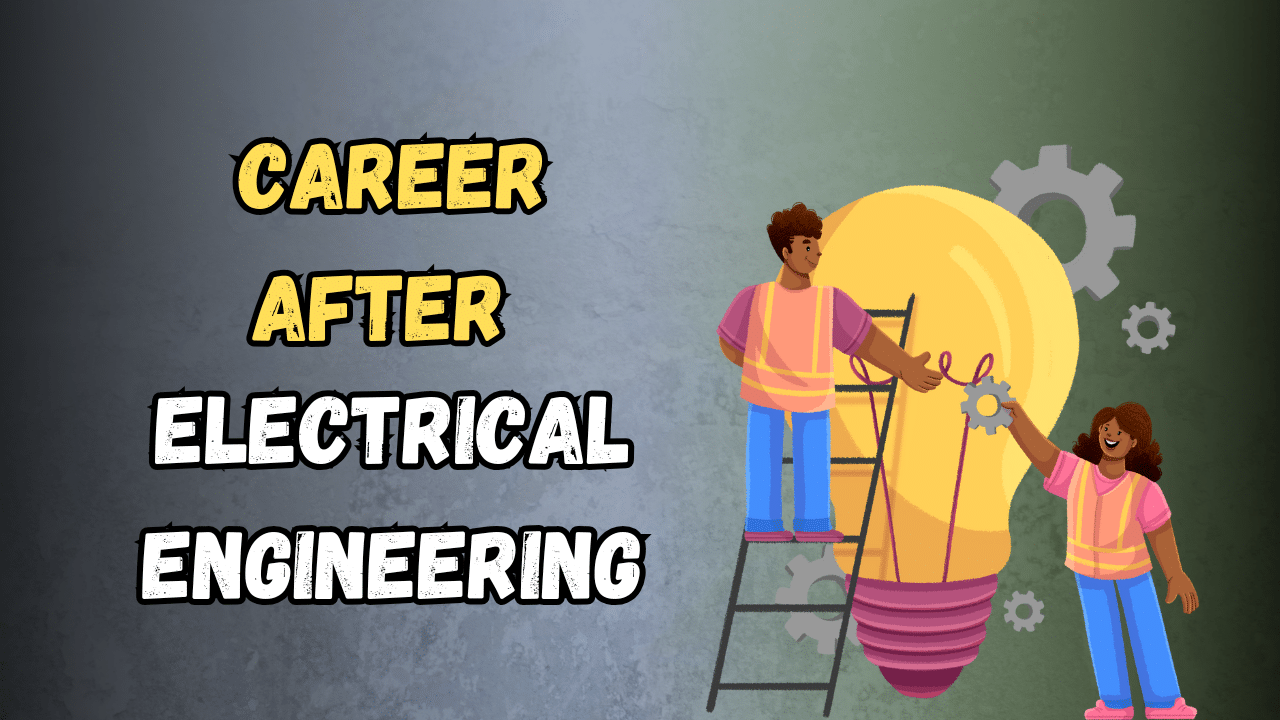Career after Electrical Engineering: A Complete Career Guide for Graduates
Finishing a degree in Electrical Engineering (EE) is a commendable feat. Being one of the oldest and most prestigious fields of engineering, EE has an extensive range of opportunities in core as well as interdisciplinary areas. Yet, it leaves many graduates guessing: What should I do next?

Whether you are keen on electronics, want to become a manager, or want to explore new areas of modern technology like AI or automation, the best career paths following electrical engineering will be described here.
1. Take a Core Job in Electrical Engineering
The most straightforward and rational option is to start your professional career in the core electrical industry. Power generation, electrical infrastructure, and electronics manufacturing companies provide stable and challenging jobs that keep you near the principles you learned during your degree.
Job Roles:
- Electrical Design Engineer
- Power Systems Engineer
- Control and Instrumentation Engineer
- Maintenance Engineer
- Substation Engineer
Top Employers:
- Siemens
- Schneider Electric
- ABB
- General Electric
- NTPC, BHEL and other public sector undertakings (PSUs)
Required Skills:
- Circuit analysis, transformers, motors
- Knowledge of tools such as MATLAB, PSCAD, ETAP and AutoCAD Electrical
- Familiarity with safety and energy regulations
How to Get In:
- Take part in campus placements.
- Apply through job portals such as Naukri, LinkedIn and Monster.
- Walk into walk-in interviews in core companies.
- Obtain industry-related certification.
Having a core job not only enables you to implement your technical skills but also paves the way for future leadership positions in the electrical industry.
2. Pursue Higher Studies (M.Tech, MS or MBA)
Postgraduate studies can increase your expertise and create higher-level career opportunities. It’s a favored choice for students who wish to specialize more or switch to new fields.
M.Tech in India
You may specialize in:
- Power Systems
- Control Systems
- VLSI Design
- Embedded Systems
- Electrical Machines
Typically, entry is made via GATE. With an MTech, you can work in government and private sector organizations as a teacher or in research and development.
MS Abroad:
If you wish for international exposure, an MS in Electrical Engineering from the US, UK, Germany, or Canada is a very strong choice. Popular specializations are:
- Embedded Systems
- Signal Processing
- Renewable Energy Systems
- Robotics and Automation
To apply abroad, prepare for GRE and TOEFL/IELTS and start early with university shortlisting and SOP writing.
MBA:
If you are leaning towards leadership or management, MBA is a great choice. Popular domains include:
- Operations
- Supply Chain
- Finance
- Marketing
- Business Analytics
- Top exams include CAT, GMAT and XAT.
Benefits of Higher Studies:
- Broader career choices
- Higher salary potential
- Improved analytical and leadership skills
No matter whether you opt for technical expertise or business leadership, higher studies can be a game-changer following electrical engineering.
3. Prepare for Government Jobs and PSUs
Various electrical engineering students dream of serving the nation while having job security. Government jobs are not just prestigious but also long-term beneficial with stability.
Government Sector options:
- PSUs such as NTPC, ONGC, IOCL, BHEL, PGCIL and GAIL (through GATE)
- Indian Engineering Services (IES) by UPSC
- Staff Selection Commission Junior Engineer (SSC JE)
- State Electricity Boards and Public Works Departments
- Indian Railways (RRB JE/SSE)
- DRDO and ISRO
How to Prepare:
- Select your path (GATE, ESE, or SSC) well in your final year.
- Make use of standard textbooks such as RK Rajput and JB Gupta.
- Practice past years question papers and attend test series.
Perks:
- Job security and pension
- Housing, travel and medical benefits
- Respect and recognition
If you are willing to make the effort, government jobs can provide a satisfying and balanced life with a lot of scope for growth.
4. Find Careers in IT and Software Industry
Electric engineers are renowned for their analytical mind and problem-solving skills, which are in demand in the world of technology. Most engineers migrates into the IT industry by upskilling and secure lucrative jobs in top companies.
Popular IT Careers:
- Software Developer
- Data Analyst
- Backend Engineer
- Quality Assurance Engineer
- Cybersecurity Analyst
Skills to Acquire:
- Programming languages such as Python, C++ or Java
- Web development or app development frameworks
- Data Structures and Algorithms
- Databases (SQL, MongoDB)
Courses & Platforms:
- Coursera, edX and Udemy
- FreeCodeCamp and GeeksforGeeks
- Coding Ninjas or Crio.do
Job Entry Points:
- IT service companies like TCS, Infosys, Wipro
- Product-based companies like Google, Amazon and Flipkart
- Startups and freelancing platforms
The technology world is continuously evolving, and with the right preparation, electrical engineers can discover lucrative careers even outside their own domain.
5. Transition Into Emerging Technologies
Electrical engineers are best placed to transition into future and interdisciplinary areas due to their analytical aptitude and mathematical skills. New areas like AI, IoT and renewable energy are fast adopting talented engineers.
Trending Areas:
- Artificial Intelligence and Machine Learning
- Internet of Things (IoT)
- Renewable Energy and Solar Systems
- Electric Vehicles (EV)
- Robotics and Automation
- Smart Grids and Home Automation
How to Begin:
- Choose a niche that excites you.
- Take relevant certification courses (Google, IBM, NPTEL, etc.).
- Work on practical projects and internships.
- Contribute to open-source communities or start your own blog/YouTube channel.
Career Impact:
These domains not only offer excellent salaries but also provide opportunities to contribute to socially impactful solutions — like clean energy and smart infrastructure.
Whether you wish to mold the future of technology or join the cause for sustainability, now is the ideal moment to dive into emerging technologies.
6. Be an Entrepreneur or Start a Business
If you possess an innovative spirit and the courage to experiment, opening your own business might be the ideal step after electrical engineering.
Business Ideas for EE Graduates:
- Solar panel installation and consultancy
- Starting an electric vehicle charging station business
- Home automation services based on IoT
- PCB manufacturing and design
- Electrical safety audit services
Steps to Start:
- Establish market validation for your idea.
- Develop a business plan and pitch deck.
- Get accepted into incubators such as Startup India, T-Hub or NASSCOM.
- Learn fundamentals of marketing, finance, and operations.
Why It’s Worth It:
- No limit to the growth potential
- Freedom to be creative
- Personal and professional fulfillment
Entrepreneurship isn’t a cakewalk, but with proper preparation and assistance, electrical engineers can create strong and scalable ventures.
Conclusion: Choose Your Path, Build Your Future
Electrical engineering is not merely a degree it’s a door to infinite career prospects. You might choose to remain on the core, move to IT, clear government exams or start your own firm; the options are many and lucrative.
For successful career: Check this page







